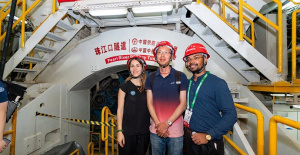MADRID, 19 Feb. (EUROPA PRESS) -
The Minister of Agriculture, Fisheries and Food, Luis Planas, appealed this Monday to the responsibility of the autonomous communities so that, within the scope of their own powers, they are involved in the adoption of measures that respond to the concerns of farmers. and livestock farmers, in coordination with the Government and in accordance with the decisions on flexibility of the Common Agricultural Policy (CAP) adopted by the European Union (EU).
Planas has chaired by videoconference the meeting of the Consultative Council on Common Agricultural Policy for Community Affairs preparatory to the Council of Ministers of the EU that will be held next Monday, the 26th. At this meeting he has asked the autonomous communities for "collaboration and support" to the application of the 18 measures committed by the Government in the last meeting with agricultural organizations and for them to also arbitrate complementary initiatives.
The key point on the agenda of the ministerial meeting on February 26 is the "need for rapid and structural responses to the current crisis situation in the agricultural sector." Spain has already sent the proposals of the Spanish Government to the current Presidency of the Council of the EU, as well as to the Commissioner for Agriculture and Rural Development, Janusz Wojciechowski, which has gone on to detail them to the advisors in the sector.
"In this, as in everything that is the administration of governments, we should all walk together, regardless of political color, if we really want to respond to the problems," the minister assured.
Planas recalled that article 148 of the Spanish Constitution establishes that the autonomous communities "may assume powers in agriculture and livestock, in accordance with the general organization of the economy."
In this sense, he pointed out that the autonomous communities "have a lot to say and do" on issues that are currently on the table due to farmers' demands, some of them very simple. Thus, he has referred, for example, to improving the planning and coordination of inspections so that the same agricultural holding does not receive more than one in a year.
He has also mentioned the convenience of coordinating the calls for aid for the first installation of young farmers and ranchers that are carried out through the autonomous communities so that they are carried out every year within a predetermined period and thus provide greater certainty.
Along these lines, he mentioned aid to encourage the incorporation of young people into agricultural and livestock activities, an issue that is one of the main current challenges of the sector, and about which the minister recalled his commitment to calling the autonomous communities to a Specific extraordinary Sectoral Conference to address it and coordinate actions.
Planas has also asked the autonomous communities for support in providing advice and information to farmers and ranchers about the digital farm notebook. The voluntary nature of its application is one of the measures committed by the minister in his last meeting with agricultural professional organizations, on the 15th.
It has also suggested that, given the current circumstances of increased accident rates as a result of climate change, the autonomous communities reinforce their support for the contracting of insurance policies and reinforce that already provided by the Government, which this year will allocate 284.5 million euros to this line of aid.
With respect to the application of the chain law, the minister has reminded the autonomous communities of the need for their involvement in the inspection and control work attributed to them by law, within the framework of the management committee created with the Agency of Food Information and Control (AICA). This work, he has reiterated, will be essential to improve the application of the law and even more so given the upcoming conversion of this body into a state agency.

 Exploring Cardano: Inner Workings and Advantages of this Cryptocurrency
Exploring Cardano: Inner Workings and Advantages of this Cryptocurrency Seville.- Economy.- Innova.- STSA inaugurates its new painting and sealing hangar in San Pablo, for 18 million
Seville.- Economy.- Innova.- STSA inaugurates its new painting and sealing hangar in San Pablo, for 18 million Innova.- More than 300 volunteers join the Andalucía Compromiso Digital network in one month to facilitate access to ICT
Innova.- More than 300 volunteers join the Andalucía Compromiso Digital network in one month to facilitate access to ICT Innova.-AMP.- Ayesa acquires 51% of Sadiel, which will create new technological engineering products and expand markets
Innova.-AMP.- Ayesa acquires 51% of Sadiel, which will create new technological engineering products and expand markets Abascal (Vox) criticizes that Sánchez is "victimizing" himself and calls for elections after his possible resignation
Abascal (Vox) criticizes that Sánchez is "victimizing" himself and calls for elections after his possible resignation Carlos Alcaraz reaches the round of 16 in Madrid without breaking a sweat
Carlos Alcaraz reaches the round of 16 in Madrid without breaking a sweat Some 5,000 people demonstrate in front of Congress for democracy, hours before Sánchez's decision
Some 5,000 people demonstrate in front of Congress for democracy, hours before Sánchez's decision STATEMENT: Intelligent systems used in the construction of the deepest underwater tunnel in China
STATEMENT: Intelligent systems used in the construction of the deepest underwater tunnel in China How Blockchain in being used to shape the future
How Blockchain in being used to shape the future Not just BTC and ETH: Here Are Some More Interesting Coins Worth Focusing on
Not just BTC and ETH: Here Are Some More Interesting Coins Worth Focusing on UPV students build a prototype of a wooden house to move to Equatorial Guinea
UPV students build a prototype of a wooden house to move to Equatorial Guinea The UA opens the call for the Impulso 2024 Awards for the best innovative business initiatives
The UA opens the call for the Impulso 2024 Awards for the best innovative business initiatives ALI, virtual assistant from Alicante, internationally recognized by the OECD
ALI, virtual assistant from Alicante, internationally recognized by the OECD Retrópolis brings the golden age of video games and computing to the UPV
Retrópolis brings the golden age of video games and computing to the UPV A million people demonstrate in France against Macron's pension reform
A million people demonstrate in France against Macron's pension reform Russia launches several missiles against "critical infrastructure" in the city of Zaporizhia
Russia launches several missiles against "critical infrastructure" in the city of Zaporizhia A "procession" remembers the dead of the Calabria shipwreck as bodies continue to wash up on the shore
A "procession" remembers the dead of the Calabria shipwreck as bodies continue to wash up on the shore Prison sentences handed down for three prominent Hong Kong pro-democracy activists
Prison sentences handed down for three prominent Hong Kong pro-democracy activists ETH continues to leave trading platforms, Ethereum balance on exchanges lowest in 3 years
ETH continues to leave trading platforms, Ethereum balance on exchanges lowest in 3 years Investors invest $450 million in Consensys, Ethereum incubator now valued at $7 billion
Investors invest $450 million in Consensys, Ethereum incubator now valued at $7 billion Alchemy Integrates Ethereum L2 Product Starknet to Enhance Web3 Scalability at a Price 100x Lower Than L1 Fees
Alchemy Integrates Ethereum L2 Product Starknet to Enhance Web3 Scalability at a Price 100x Lower Than L1 Fees Mining Report: Bitcoin's Electricity Consumption Declines by 25% in Q1 2022
Mining Report: Bitcoin's Electricity Consumption Declines by 25% in Q1 2022 Oil-to-Bitcoin Mining Firm Crusoe Energy Systems Raised $505 Million
Oil-to-Bitcoin Mining Firm Crusoe Energy Systems Raised $505 Million Microbt reveals the latest Bitcoin mining rigs -- Machines produce up to 126 TH/s with custom 5nm chip design
Microbt reveals the latest Bitcoin mining rigs -- Machines produce up to 126 TH/s with custom 5nm chip design Bitcoin's Mining Difficulty Hits a Lifetime High, With More Than 90% of BTC Supply Issued
Bitcoin's Mining Difficulty Hits a Lifetime High, With More Than 90% of BTC Supply Issued The Biggest Movers are Near, EOS, and RUNE during Friday's Selloff
The Biggest Movers are Near, EOS, and RUNE during Friday's Selloff Global Markets Spooked by a Hawkish Fed and Covid, Stocks and Crypto Gain After Musk Buys Twitter
Global Markets Spooked by a Hawkish Fed and Covid, Stocks and Crypto Gain After Musk Buys Twitter Bitso to offset carbon emissions from the Trading Platform's ERC20, ETH, and BTC Transactions
Bitso to offset carbon emissions from the Trading Platform's ERC20, ETH, and BTC Transactions Draftkings Announces 2022 College Hoops NFT Selection for March Madness
Draftkings Announces 2022 College Hoops NFT Selection for March Madness























